The battle of the luxury SUVs heats up as we compare two heavyweights in the segment: the Audi Q8 and BMW X5. Known for their blend of performance, comfort, and technology, these vehicles attract discerning buyers looking for both style and substance. In this article, we will delve into the technical specifications, innovations, and overall driving experience of these two prestigious models.
Audi Q8 vs BMW X5 - Differences and prices compared
Compare performance (640 HP vs 625 HP), boot space and price (77300 £ vs 77100 £ ) at a glance. Find out which car is the better choice for you – Audi Q8 or BMW X5?
Design and Dimensions
The Audi Q8 exudes a sporty and muscular stance with a length of 4,992 mm, a width of 1,995 mm, and a height of 1,697 mm. In contrast, the BMW X5 measures slightly smaller at 4,935 mm in length and 2,004 mm in width, but stands taller at 1,765 mm. Both SUVs sport a modern design language, but Audi opts for a more aggressive front-end with its prominent grille, while the X5 features BMW's classic kidney grille and sleek lines that reflect its heritage.
Powertrains and Performance
When it comes to power, both vehicles offer a range of engines to suit different preferences. The Audi Q8 provides an array of options, including a 3.0-liter V6 producing up to 490 hp and a powerful 4.0-liter V8 generating a staggering 640 hp. Fuel economy for the Q8 ranges from 8.1 L/100km for its diesel engine to around 12.8 L/100km for the petrol variants.
On the flip side, the BMW X5 boasts a robust lineup as well, featuring engines that go up to 625 hp. Similar to the Q8, it offers petrol and diesel MHEV options, achieving a fuel consumption figure as low as 7.4 L/100km. The acceleration times are impressive for both models, with the Q8 reaching 0-100 km/h in as little as 3.6 seconds and the X5 in 3.9 seconds for the high-performance variants.
Technological Innovations
Both the Q8 and X5 are packed with technological advancements to enhance the driving experience. The Audi Q8 features the MMI touch response system, which includes a dual touchscreen interface that controls everything from navigation to climate settings, offering excellent responsiveness and ease of use.
The BMW X5 counters with its iDrive system, which has been optimized for usability and now includes a 12.3-inch digital instrument cluster paired with another 12.3-inch touchscreen display. Furthermore, the X5 provides an intuitive rotary controller for easy navigation, showcasing the blend of innovation and practicality.
Interior Comfort and Space
Inside the Audi Q8, luxurious materials and a spacious cabin create a refined atmosphere. With ample passenger space and a trunk capacity ranging from 605 to 605 liters, the Q8 ensures enough room for all needs. Its seating for five is comfortable, with high-quality upholstery and strategic ergonomics.
On the other hand, the BMW X5 offers a slightly larger trunk at 650 liters, providing extra utility for cargo. The interior boasts premium finishes with customizable ambient lighting and intelligent storage solutions that enhance the overall user experience.
Safety and Driver Assistance
Safety is paramount in both vehicles, with advanced driver assistance systems that add layers of security on the road. The Audi Q8 features adaptive cruise control, lane-keeping assistance, and a rear cross-traffic alert. Meanwhile, the BMW X5 includes features like the Driving Assistant Plus and Parking Assistant, placing a strong emphasis on not just driver safety but also convenience.
Conclusion: Which SUV Reigns Supreme?
Choosing between the Audi Q8 and BMW X5 ultimately depends on individual preferences. The Q8 showcases superior acceleration and a luxurious tech-packed cabin, while the X5 shines with its traditional BMW performance and slightly more spacious cargo area. Both are exceptional offerings in the luxury SUV segment, featuring innovations and technologies that cater to a premium driving experience. Prospective buyers should take the time to test drive both models to discover which one aligns best with their lifestyle.
Here’s where it gets real: The technical differences in detail
Costs and Efficiency:
Price and efficiency are key factors when choosing a car – and this is often where the real differences emerge.
BMW X5 has a hardly perceptible advantage in terms of price – it starts at 77100 £ , while the Audi Q8 costs 77300 £ . That’s a price difference of around 257 £.
Fuel consumption also shows a difference: BMW X5 manages with 3 L and is therefore clearly perceptible more efficient than the Audi Q8 with 3.90 L. The difference is about 0.90 L per 100 km.
As for electric range, the BMW X5 performs clearly perceptible better – achieving up to 105 km, about 25 km more than the Audi Q8.
Engine and Performance:
Power, torque and acceleration are the classic benchmarks for car enthusiasts – and here, some clear differences start to show.
When it comes to engine power, the Audi Q8 has a slight edge – offering 640 HP compared to 625 HP. That’s roughly 15 HP more horsepower.
In acceleration from 0 to 100 km/h, the Audi Q8 is minimal quicker – completing the sprint in 3.60 s, while the BMW X5 takes 3.90 s. That’s about 0.30 s faster.
There’s also a difference in torque: Audi Q8 pulls to a small extent stronger with 850 Nm compared to 750 Nm. That’s about 100 Nm difference.
Space and Everyday Use:
Cabin size, boot volume and payload all play a role in everyday practicality. Here, comfort and flexibility make the difference.
Both vehicles offer seating for 5 people.
In curb weight, Audi Q8 is slight lighter – 2175 kg compared to 2240 kg. The difference is around 65 kg.
In terms of boot space, the BMW X5 offers barely noticeable more room – 650 L compared to 605 L. That’s a difference of about 45 L.
When it comes to payload, BMW X5 minimal takes the win – 705 kg compared to 665 kg. That’s a difference of about 40 kg.
Who wins the race in the data check?
The BMW X5 holds a decisive overall lead in the objective data comparison.
This result only shows which model scores more points on paper – not which of the two cars feels right for you.
Costs and Consumption
View detailed analysis
Engine and Performance
View detailed analysis
Dimensions and Body
View detailed analysis
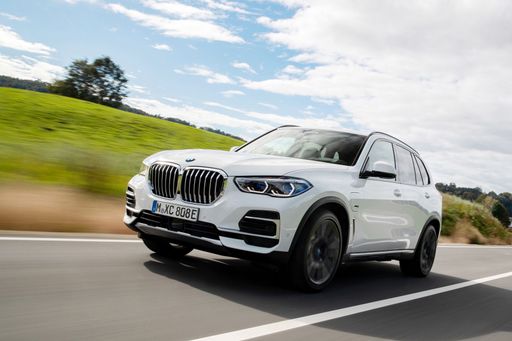
BMW X5
Audi Q8
The Audi Q8 wraps coupe-like flair around a burly SUV stance, serving up a cabin dressed in premium materials and smart tech that puts comfort and swagger front and center. It’s composed and comfortable on long runs yet happy to play when asked, making it a tempting choice for buyers who want head-turning looks without surrendering everyday practicality.
details
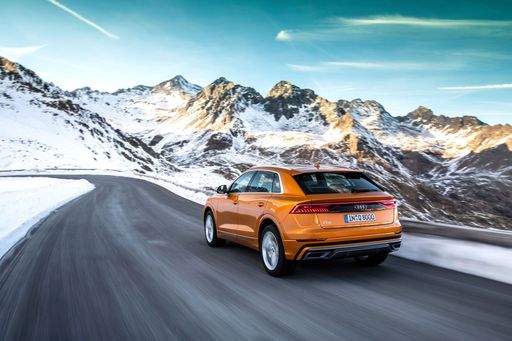
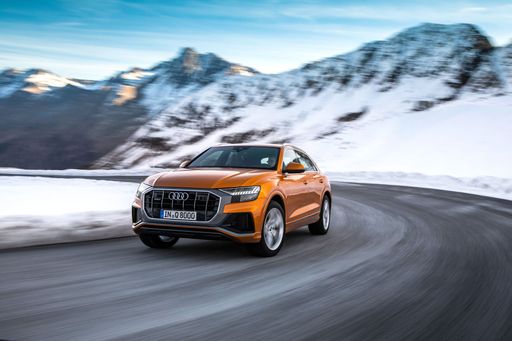
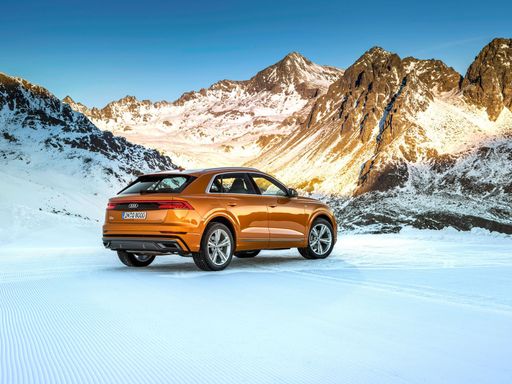
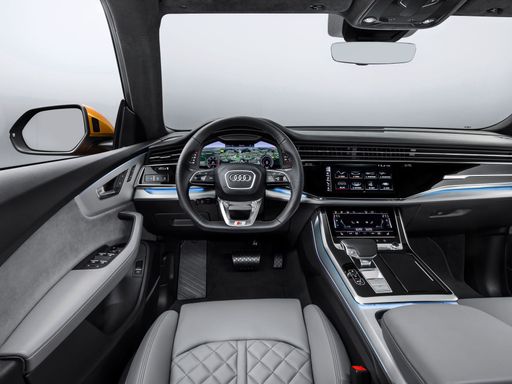

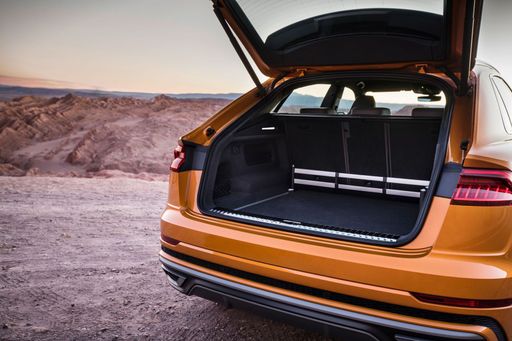
BMW X5
The BMW X5 blends athletic handling with a roomy, premium interior, feeling equally at home on twisty country roads and the school-run car park. Its executive-lounge cabin and confident road presence make it a tempting choice for buyers who want comfort, capability and just a little bit of bragging rights.
details
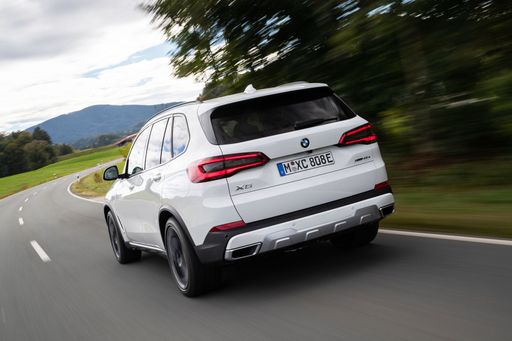
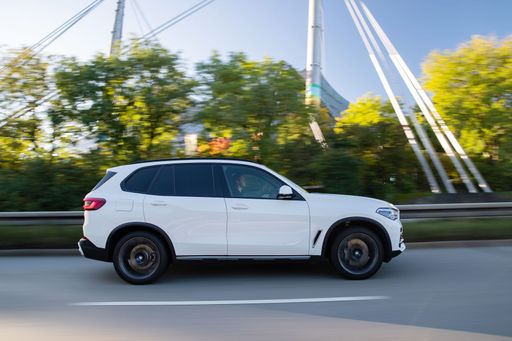
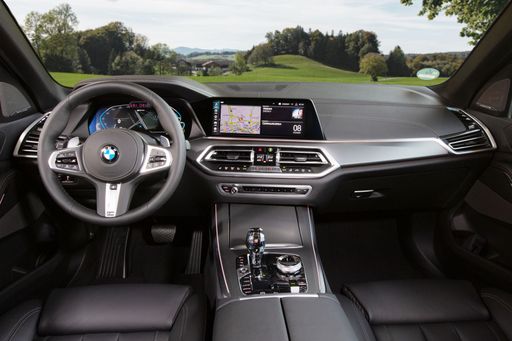
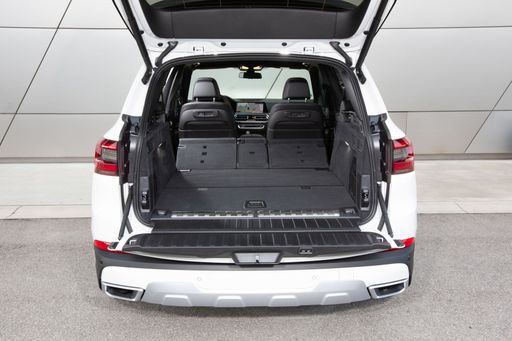
Costs and Consumption |
|
|---|---|
|
Price
77300 - 137100 £
|
Price
77100 - 143500 £
|
|
Consumption L/100km
3.9 - 13.1 L
|
Consumption L/100km
3 - 12.8 L
|
|
Consumption kWh/100km
-
|
Consumption kWh/100km
-
|
|
Electric Range
80 km
|
Electric Range
105 km
|
|
Battery Capacity
-
|
Battery Capacity
25.70 kWh
|
|
co2
88 - 297 g/km
|
co2
68 - 289 g/km
|
|
Fuel tank capacity
-
|
Fuel tank capacity
69 - 83 L
|
Dimensions and Body |
|
|---|---|
|
Body Type
SUV
|
Body Type
SUV
|
|
Seats
5
|
Seats
5
|
|
Doors
-
|
Doors
5
|
|
Curb weight
2175 - 2490 kg
|
Curb weight
2240 - 2495 kg
|
|
Trunk capacity
439 - 605 L
|
Trunk capacity
500 - 650 L
|
|
Length
-
|
Length
4935 mm
|
|
Width
1995 - 2007 mm
|
Width
2004 - 2015 mm
|
|
Height
-
|
Height
1755 - 1765 mm
|
|
Max trunk capacity
-
|
Max trunk capacity
1720 - 1870 L
|
|
Payload
620 - 665 kg
|
Payload
565 - 705 kg
|
Engine and Performance |
|
|---|---|
|
Engine Type
Petrol MHEV, Diesel MHEV, Petrol, Plugin Hybrid
|
Engine Type
Petrol MHEV, Diesel MHEV, Plugin Hybrid
|
|
Transmission
Automatic
|
Transmission
Automatic
|
|
Transmission Detail
Automatic Gearbox
|
Transmission Detail
Automatic Gearbox
|
|
Drive Type
All-Wheel Drive
|
Drive Type
All-Wheel Drive
|
|
Power HP
231 - 640 HP
|
Power HP
298 - 625 HP
|
|
Acceleration 0-100km/h
3.6 - 7.1 s
|
Acceleration 0-100km/h
3.9 - 6.1 s
|
|
Max Speed
-
|
Max Speed
250 km/h
|
|
Torque
500 - 850 Nm
|
Torque
540 - 750 Nm
|
|
Number of Cylinders
6 - 8
|
Number of Cylinders
6 - 8
|
|
Power kW
170 - 471 kW
|
Power kW
219 - 460 kW
|
|
Engine capacity
2967 - 3996 cm3
|
Engine capacity
2993 - 4395 cm3
|
General |
|
|---|---|
|
Model Year
2025
|
Model Year
2025
|
|
CO2 Efficiency Class
G, B
|
CO2 Efficiency Class
G, B
|
|
Brand
Audi
|
Brand
BMW
|
What drive types are available for the Audi Q8?
Available configurations include All-Wheel Drive.
